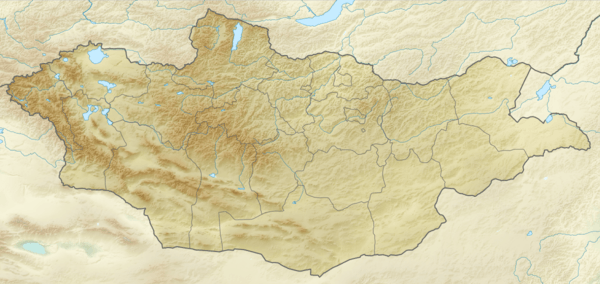Tsambagarav
Tsambagarav (Mongolian: Цамбагарав) is a mountain between Khovd Province and Bayan-Olgii Province in western Mongolia, it is a mountain of the Altai Mountains range. It has two peaks, its highest peak "Tsast Uul" (Mongolian: Цаст, lit. "snow-covered peak") has an elevation of 4,193 metres (13,757 ft) and another peak same named "Tsambagarav" (48.655196,90.847063). The mountain is the stand-alone eternally snow-capped mountain of the Mongol Altai[3] and the regional sacred mountain in Mongolia.
| Tsambagarav | |
|---|---|
| Tsast Uul | |
Tsambagarav Mountain in July | |
| Highest point | |
| Elevation | 4,193 m (13,757 ft) [1][2] |
| Prominence | 1,757 m (5,764 ft) [1] |
| Listing | Ultra |
| Coordinates | 48°40′54″N 90°43′30″E [1] |
| Geography | |
 Tsambagarav Location in Mongolia | |
| Location | Mongolia |
| Parent range | Mongol-Altai Mountains |
Massif of Tsast Uul-Tsambagarev. Italians Gianni Pais Becher, Gastone Lorenzini and Elziro Molin climbed in western Mongolia in June and July. In late June, they first climbed Tsast Uul (4250 meters, 13,944 feet), the second highest peak in Mongolia, by the normal route. On June 27, they established Base Camp at 2520 meters north of the massif and the next day placed a camp in an alpine meadow. On June 29 the three Italians with Mongolians Jndonpuncav, Gotov, Samubun and Battulga climbed a 55° ice slope to the summit of unclimbed P 4030 (13,222 feet). On June 30, they moved camp to Tavan Betchir. On July 2, they started for a peak they had seen from Tsast Uul. They had to climb over a ridge to 3800 meters, down the far side, across a glacier and finally up the icy, 60° northwest face of P 4150 (13,616 feet). The summit was reached by Pais Becher, Molin, Mongolians Dorjpalam, Tumentogootch, Damba, Rentsenbyamba, Gaadamba and Vantchig
References
- "Mongolia: 18 Mountain Summits with Prominence of 1,500 meters or greater". Listed as "Tsast Uul". Peaklist.org. Retrieved 2014-05-26.
- "Tsast Uul, Mongolia". Peakbagger.com. Retrieved 2014-05-26.
- Nomadic Journeys Western Mongolia Trek